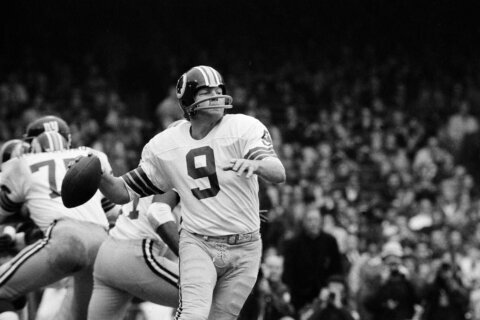Washington’s NFL franchise officially announced Monday it will drop its controversial name after 87 years, signaling the imminent end of an era in which the franchise was labeled with a dictionary-defined racial slur.
Former Washington players, activists, experts and other officials shared their reactions with WTOP. Fans and celebrities alike reacted to the news on social media.
“The R word itself is a racial slur, but everything that goes with that, the Native imagery, all of those things are offensive and stereotypical, and so the greatest hope is that he [team owner Dan Snyder] chooses a name that has nothing to do with ethnicity or racial groups at all,” John Two-Hawks, a curator at nativecircle.com, told WTOP.
Kevin Gover, director of the Smithsonian’s National Museum of the American Indian, first wrote a letter to the NFL team about its name in 1973. For him, Monday’s announcement was welcome, but only a start.

“The demand is not just to get rid of the name but to stop using Native Americans as mascots, and that applies not just to the Washington football team but to all of the professional, and even college and high school, teams that continue to use Native imagery in support of their teams,” Gover said.
Former Redskins offensive lineman and member of the fabled “Hogs,” Jeff Bostic, shared opposing thoughts about the name change with WTOP.
“I think everybody was so proud of that name when I was fortunate enough to play and like I said, it’s just that our society has changed from when I started in 1980 to where it is right now,” Bostic told WTOP.
“Our country has become so socially correct and politically correct. I loved what Dan Snyder said seven or eight years ago, that ‘I’ll never change the name,’ but this is nothing more than business. This is monetary and that’s exactly the impetus behind Dan Snyder’s decision — money.”
Gover and Two-Hawks acknowledged that corporate pressure was what likely caused Snyder to change the name, but what influenced that corporate pressure is the important thing.
“We gave up a long time ago on the idea that the simple morality of the issue would lead ownership to the right decision,” Gover said. “Having said that, the strategy of the anti-mascot people for a very long time has been to damage the brand and make it less valuable.”
Sports journalist Kevin Blackistone is a frequent panelist on ESPN’s “Around the Horn.” In addition, he teaches at the Philip Merrill College of Journalism at the University of Maryland, and he also writes sports commentary for The Washington Post.
Blackistone believes the team needs to make a complete break from the Native American imagery, and the names that are floating around — such as Red Tails, Red Wolves or Warriors — mimic what the team was pressured to get away from.
“The idea of red and what that means to Native people is a reminder of what you were, and that’s not a clean enough break for me,” Blackistone told WTOP’s Dave Johnson.
Blackistone said the name Red Tails, to honor the Tuskegee Airmen, seems to be a “bone that owners are throwing to Black fans to placate us and make us feel better.”
He also believes that NFL games have “enough militarization,” when the military has nothing to do with this.
“Tuskegee Airmen brings back segregation. Sure the Tuskegee Airmen overcame great odds, but it also reminds me of the odds they had to overcome,” Blackistone said.
The National Office for Tuskegee Airmen Incorporated told Deadspin that it would be “honored” to work with the NFL franchise if it were to change the name of the organization to the Washington Red Tails.
Former team play-by-play announcer Frank Herzog summed up what likely drove the decision in one word: money.
“When FedEx, Nike, Pepsi, Target, all these other retailers said, ‘That’s it. We’re not going to merchandise them anymore,’ that turned the tide as far as Mr. Snyder was concerned,” Herzog said.
Herzog believes the process has been going on for a couple of months.
“The only thing that surprises me is that [Snyder’s] gone ahead and picked the name, but they might have a contest but other than that. Not surprised at all,” Herzog said.
Herzog said Snyder is going to make a fortune on merchandise, when fans buy new clothes, jerseys, hats, decals and coffee cups with the new name.
“Money. That’s what counted,” Herzog said.
Nneka Logan, a professor of communication at Virginia Tech who specializes in corporate communication and social responsibility, said that just because it was the pressure from sponsors that likely led to the name change doesn’t mean the years of advocacy from Native Americans wasn’t effective.
“I think without the activism of Native Americans and other groups pressuring the Redskins to change the name that has been going on for years and years and years, without that, I don’t think you’d see corporate America stepping up and then saying, ‘Hey, you need to make this change,'” Logan said.
“You need the grassroots to get the big dollar corporations to make a change. They work together,” she said.
However, one thing is missing that makes Blackistone doubt that team ownership had a genuine moment of enlightenment about why a name change was necessary — an apology.
“You’ve heard none of that. That’s what makes it so disingenuous to me. So tone deaf that no one has said that,” Blackistone said.
As for what’s next, Matt Williams was involved in another marquee name change in Washington. He was the vice president of communications for the Washington Bullets when the team decided to change its name in 1995. The team didn’t play its first season as the Wizards until 1997.
“The entire time you’re trying to cross all the Ts and dot the Is to make sure that the entire brand is being launched properly,” Williams said.
The Washington NBA team launched a contest for public input for the new name. Even if the Washington NFL team doesn’t go that route, Williams said the team should decide on a name, commit to it and move past the old name.
“You’re not picking a GM; you’re picking a name that’s going to be representative of the entire region,” said Blackistone, who supports community involvement in choosing the name of the football team.
“You’re never going to make everyone happy and that’s the big take-away here, and that’s what I would tell the Redskins,” Williams said.
Will the change have an impact on fans of Washington football long-term?
Washington Post sports columnist John Feinstein told WTOP he doesn’t think so.
“Your team is your team,” he said. “I don’t think they’ll change the team colors. If the team is winning people are going to go the stadium, people are going to buy the new gear. If the team is losing, then they’re going to be very unhappy but that has nothing to do with the name.”
Herzog said it was time to change the team’s name.
“The reality is it has to change. We’re changing as a nation. We’re changing as a people, and it’s time to make that change.”
Reactions on social media
As many reminisced over the Burgundy and Gold’s glory years, some celebrated the retirement of the offensive current name, and noticed the team’s official news release hadn’t done enough to dissociate from it.
R*dsk*ns, a Washington football team name that came from the taking of scalp bounties from Native people, is officially retired! Don’t pat racist ass team owners or franchise defenders on the back. This victory belongs to Native people and is about more than a name. https://t.co/dz6dcUgwSC
— Nick Estes (@nick_w_estes) July 13, 2020
They still managed to print the name seven times in the news release saying they were retiring the name https://t.co/freqqsnmOd
— Noah Frank (@NoahAFrank) July 13, 2020
Dan Snyder gets no applause for retiring a racist slur at least a decade beyond decency. Let the Washington name be a reminder of the inertia of the NFL, and the indulgence of rich white men.
— Jane McManus (@janesports) July 13, 2020
More proof. Money talks the loudest. pic.twitter.com/Ovvc2Mbgnb
— Craig Melvin (@craigmelvin) July 13, 2020
No direct quote from the owner, and sponsors listed before fans twice in the same news release. https://t.co/eHOw0invEg
— Daniel Shiferaw (@dshif) July 13, 2020
It’s funny seeing people point to the fact sponsors are mentioned in this name change release like it’s a surprise. It’s the ONLY reason this is happening. Never forget that
— ᑎIᑕK ᗩᔕᕼOOᕼ 🤧 (@NickAshooh) July 13, 2020
WTOP asked listeners how they feel about the name change and what the new name should be.
Many of those who responded expressed dissatisfaction with team owner Dan Snyder.
“The Team formerly owned by Dan Snyder” has a nice ring to it.
— Yukon Cornelius, Ph.D. (@Y_Cornelius_1) July 13, 2020
Washington “For Sale By Owner” … maybe?
— ROCK THE RED DIVA #ALLCAPS (@RockTheRedDiva) July 13, 2020
Fine. Change it.
Just know Snyder is still the worst owner and only making this move to avoid revenue losses. If he were enlightened, he would have done this years ago and not fought it in court. No medal for him.— LINDA RIGSBY (@LINDARIGSBY5) July 13, 2020
Others took a more practical approach.
Keep the Burgundy and Gold. Change the team nickname to the Washington Federals. Washington is a federal city; home to the federal government. The other team names in the city are not offensive: Nats, Caps, Wiz. Now: Feds. Do it!
— Rick Horten (@RickHorten) July 13, 2020
Other fans on Twitter expressed sadness to see the brand go with an eye toward the future.
Being a fan, to me, isn’t truly about owners, team presidents, GMs, coaches, players, colors or even a team name. They all matter, but they all come & go. Being a fan at its core is about memories, excitement & hope. And none of that can ever be taken away. #RIPRedskins #HTTR
— Al Galdi (@AlGaldi) July 13, 2020
mood #RedskinsForever pic.twitter.com/i2c6WvXuYk
— Matt (@_MC1932) July 13, 2020
For 29 years I am living und mostly suffering with the #Redskins. I celebrated a Super Bowl, cried for Sean Taylor, cheered for RGIII and will only say this: I was always proud to be a Redskin and celebrate the Native American culture. To me it’s #HTTR for live no matter the name https://t.co/V53uewPCj0
— Eric Böhm (@EricBoehm04) July 13, 2020
Though former Washington players from the team’s glory years during the 1980s-90s — most notably MVP kicker Mark Moseley and two-time Super Bowl champion receiver Gary Clark — expressed sorrow to see the name go, some players during the Snyder era were excited about a name change.
The name will change tomorrow but the memories will remain! #HTTR pic.twitter.com/hEgf1ixZ9H
— Phillip Daniels (@PhillipDaniels) July 13, 2020
I’d want to come back to Washington for one day and retire a Red Wolf
GOD what a name! S/o the Washington fans pushing for this to happen 🐺 pic.twitter.com/7Cc2GhRg0z
— Will Compton (@_willcompton) July 10, 2020
If Washington changes their name, I’ll buy a hat within a week.
— Sage Rosenfels (@SageRosenfels18) July 3, 2020
WTOP’s Abigail Constantino, Dave Johnson and Megan Cloherty contributed to this report.







